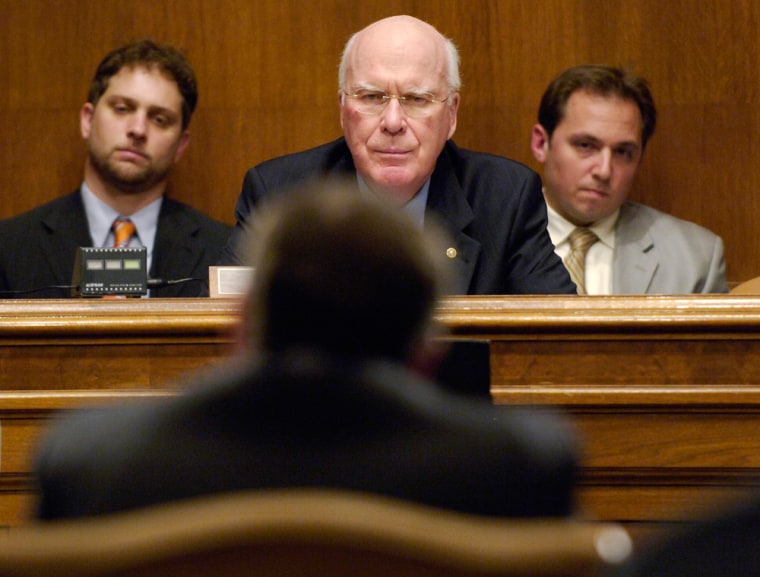Though Congress is on vacation, majority Democrats are keeping alive various fights with the White House with one common thread: Congress' access to administration documents and testimony to which President Bush has claimed executive privilege.
Smack in the middle of the August break, the White House faces a new deadline for producing subpoenaed information about the legal justification for the president's secretive eavesdropping program.
And aides in both chambers are considering a selection of ways to deal with Bush's refusal to let current and former advisers testify publicly about their roles in the firings of federal prosecutors. Contempt proceedings could begin in the House as early as September.
Ending Gonzales' tenure
Still other officials are considering ways to, in the words of one Republican, "end the tenure of Attorney General Gonzales." That would be Alberto Gonzales, longtime presidential friend and embattled head of the Justice Department whose congressional testimony has drawn quiet, if any, defense from White House allies on Capitol Hill.
Senate Judiciary Committee Chairman Patrick Leahy on Wednesday set an Aug. 20 deadline for administration officials already subpoenaed to provide documents and testimony about the National Security Agency's eavesdropping program.
In a letter to White House Counsel Fred Fielding, Leahy noted that he granted the White House's request to postpone the subpoenas' original July 18 deadline. Leahy, D-Vt., said Wednesday he'd wait no more.
"You have rejected every proposal, produced none of the responsive documents, provided no basis for any claim of privilege and no accompanying log of withheld documents," Leahy wrote to Fielding.
The committee on June 27 subpoenaed the Justice Department, National Security Council and the offices of the president and vice president for documents relating to the National Security Agency's legal justification for the wiretapping program.
Contempt citiation pending
On the U.S. attorneys probe, House officials expect by the end of the month to decide when and under what circumstances to bring a contempt citation to the floor against White House Chief of Staff Josh Bolten and former presidential legal counselor Harriet Miers. Bolten and Miers did not comply with their subpoenas for documents and information.
As for Gonzales' fate, Bush still supports him and the attorney general showed no sign of heeding widespread calls for his resignation.
Meanwhile, the American Civil Liberties Union kept up its own drumbeat against the eavesdropping program, asking a secret court that oversees it to explain publicly the need to revamp laws that expand the government's authority to spy on foreigners.
Congress last weekend approved an update to the 1978 Foreign Intelligence Surveillance Act, allowing the government to eavesdrop on terror suspects overseas without first getting a court warrant. The overhaul, according to House Republican leader John Boehner, was the result of a recent Foreign Intelligence Surveillance Court ruling that banned eavesdropping on foreigners when their messages were routed though communications carriers based in the United States.
The ACLU wants that ruling to be released publicly _ which would be a near-unprecedented move by the court that deals solely with classified information.
"Publication of these secret court orders is vitally important to the ongoing debate about government surveillance," said ACLU attorney Jameel Jaffer. "The public has a right to firsthand information about what the court permitted and what it disallowed."
